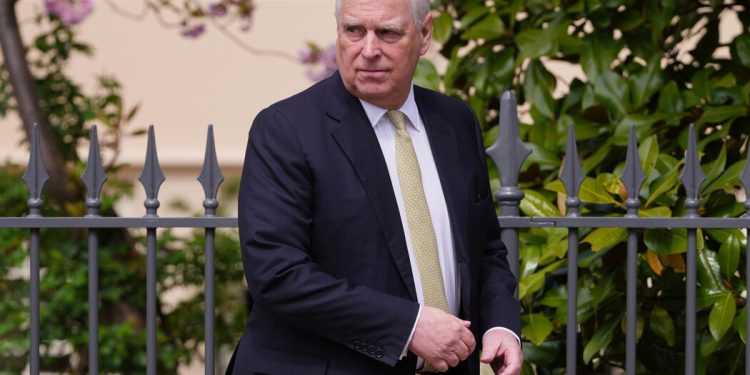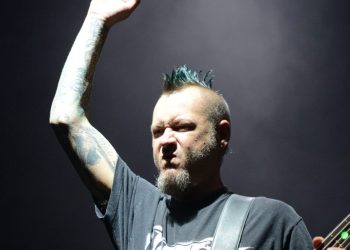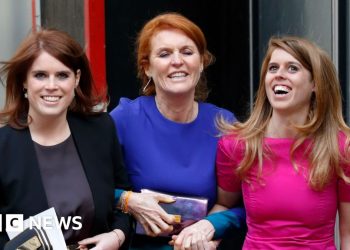When Prince Andrew issued a terse statement on Friday confirming he would stop using his title Duke of York, it appeared to be a definitive attempt to put an end to a scandal that has haunted the British royal family for a decade. Yet in some ways it was just another step in a long walk toward shame.
With each new sordid detail or explosive accusation regarding his ties to convicted sex offender Jeffrey Epstein, the royal family erodes Andrew’s golden veneer. He was banned from public life in 2019, and stripped of his honorary military titles and the honorary title of “His Royal Highness” in 2022.
The loss of the title of Duke of York is a particularly hard blow, royal watchers say, because it dates from the 14th century and is traditionally bestowed on the second sons of monarchs. It’s also Andrew’s main calling card in the troubled life he’s led since his glamorous youth as a war hero and eligible bachelor.
Now aged 65 and living in isolation in a stately home on the Windsor estate, west of London, Andrew remains a prince – this status comes from being the descendant of a sovereign, Queen Elizabeth II – but he is otherwise an outcast. Buckingham Palace made it clear he was not welcome at the family’s Christmas reunion.
“The pressure on the monarchy to ostracize Andrew has simply become too much,” said Ed Owens, a historian who writes about the royal family. “As opinion polls reveal a subtle but steady decline in support for the monarchy, the king and his heir have finally taken firm action against Andrew to try to stem the bleeding. »
Mr Owens was referring to King Charles III, whom Andrew consulted before making his announcement, and the king’s eldest son, Prince William. As heir to the throne, Mr Owens said, William would have been involved in the deliberations that led to a further downgrade of his uncle’s royal status.
Even by Andrew’s scandal-tinged standards, the past week has been marked by a parade of damaging accusations, most notably in the new memoir of Virginia Roberts Giuffre, a victim of Mr. Epstein’s sex trafficking ring, who has accused the prince of raping her when she was a teenager — an accusation he denies.
Ms Giuffre committed suicide in Australia in April, but her book, “Nobody’s Girl”, which will be published in the United States next Tuesday and extracts of which have appeared in the British press, opens Andrew to further public opprobrium. Among the details, Ms. Giuffre described a sexual encounter, during which she wrote: “he was particularly attentive to my feet, caressing my toes and licking my arch.”
In a statement, Ms Giuffre’s family said Andrew’s relinquishment of his title was “vindication for our sister and survivors everywhere”.
On Friday, Andrew said: “I vigorously deny the allegations against me. » In renouncing the use of his title Duke of York, he said: “I have decided, as I always have, to put duty to my family and my country first. »
Two British newspapers reported last week that Andrew sent Mr. Epstein a reassuring email in 2011, a year after he claimed in a 2019 BBC interview that he had cut off contact with his friend. In the email published by The Mail on Sunday and The Sun on Sunday, he wrote to Mr Epstein: “We are in this together.” The New York Times has not independently verified the email.
The revelation that another prominent Briton, Peter Mandelson, had been in contact with Mr. Epstein for longer than publicly known led to Mr. Mandelson’s rapid dismissal in September as Britain’s ambassador to Washington. Britain differs from the United States in that the Epstein affair has yet to result in comparable American losses.
Andrew was even embroiled in a scandal involving Chinese spying efforts in Britain, with reports in the Times of London and the Daily Telegraph, based on court documents, alleging he met repeatedly with Cai Qi, a senior Chinese official close to Chinese President Xi Jinping.
Prosecutors believe Mr. Cai received information gathered by two Britons who worked with members of the British Parliament active in Chinese affairs. Prosecutors dropped espionage charges against both men, which has become a political headache for Prime Minister Keir Starmer.
Last December, a British immigration court upheld a government decision to exclude from the country a Chinese man, Yang Tengbo, who was a “close confidant” of Andrew, on national security grounds. The prince said at the time that he had “ceased all contact” with Mr Yang after government officials raised concerns, adding that the two had “did not discuss anything of a sensitive nature”.
But the court’s decision cast an unflattering light on Andrew’s diminished status. It cited a 2021 document taken from Mr. Yang’s cellphone that discussed talking points from a call between him and the prince. The document suggested that Andrew was hungry for negotiating opportunities in China.
“It is really important not to set expectations too high,” the document says. “He is in dire straits and will hold on to anything.”
The palace’s decision to make it known that Andrew would be banned from its Christmas celebrations, two people with knowledge of the royal family said, was calculated in part to demonstrate that he does not have special access to senior royals like Charles or William. This would discourage outsiders from seeking to use Andrew as a conduit to senior members of the family.
Of all the scandals looming over the prince, these people say, the publication of Andrew’s email to Mr. Epstein might have been the most damning. He revealed that the account he gave to Emily Maitlis, a former BBC journalist on the ‘Newsnight’ show in 2019, was dishonest.
The palace has long since stopped defending it. In 2022, when a judge ruled that Ms. Giuffre’s sexual abuse lawsuit against him could move forward, the palace said it would “defend this case as a private citizen.”
During the Queen’s lifetime, Andrew still had influential support. She helped finance the undisclosed payment he made to Ms Giuffre to settle her lawsuit, which he did without admitting guilt. But after the death of his mother in September 2022, Andrew’s situation became more precarious.
Mr Owens, the historian, said the family’s latest action against Andrew reflects its awareness that public support for the monarchy is gradually waning. In 2023, a poll of British social attitudes by the National Center for Social Research found that 54% of respondents said it was “very” or “somewhat important” for Britain to have a monarchy, up from 86% in 1983.
“This wider context is essential,” Mr Owens said, “and it raises the question of whether the monarchy will now also address the other major point of public concern: the opaque nature of the royal finances.”









